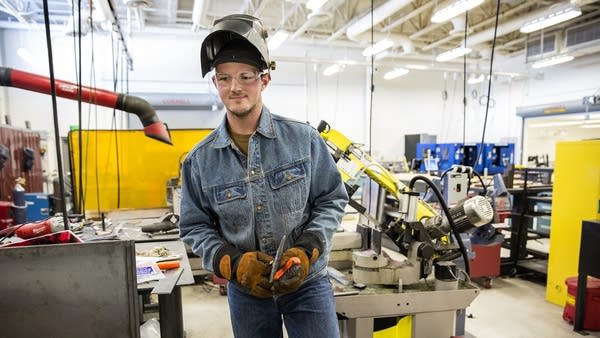Career, technical teachers in short supply at Minnesota schools

Go Deeper.
Create an account or log in to save stories.
Like this?
Thanks for liking this story! We have added it to a list of your favorite stories.
Minnesota schools say they don't have enough teachers to help prepare high school students for careers, and in the coming weeks lawmakers at the Capitol are expected to step in to help.
The debate about career-focused classes like manufacturing, business and health care has been part of a broader state conversation about changes to teacher licensing.
This session, lawmakers will likely move Minnesota to "tiered" licensure, where applicants can get into the profession with minimal requirements that might not include the current requirement of a four-year college degree. Teachers would move up to longer-term licenses as they add training and experience.
When it comes to career-specific education, a recent Minnesota Department of Education report found that a third of teachers in five fields are currently teaching under some kind of special state permission. Districts can request permissions when they can't find a fully licensed teacher.
Turn Up Your Support
MPR News helps you turn down the noise and build shared understanding. Turn up your support for this public resource and keep trusted journalism accessible to all.
"Especially in agriculture and industrial tech, there just aren't many universities graduating those teachers anymore," said Alexandria Area High School principal Chad Duwenhoegger.

Duwenhoegger would know: Alexandria students choose a career interest area to focus on starting in 10th grade. Options include business, manufacturing and health care careers.
The school has state-of-the art facilities including a metal shop, culinary lab, and two greenhouses.
"We're saying, OK, what are you passionate about, what do you love to do? And then helping them get the skillset to get to where they want to be, be it a two-year school, be it military, be it a one-year [or] a four-year degree," Duwenhoegger said.

Duwenhoegger said while most Alexandria graduates go on to some kind of further education, local businesses are eager for employees. State data show some industries, like construction and health care, with above-average demand for workers.
So some students, like senior Devin Lancaster, plan to go straight to jobs. Devin said he already has a couple job offers. On a recent morning, he scrutinized a metal table he's building for a local machining company as part of a senior capstone class. The structure raises and lowers to aid workers in loading pipe into a machine.

"The pipe is in a wooden box 16 inches high and weighs 2,000 pounds. They have to be able to roll it around the machines and then load it up," Devin explained, flipping the table over to do some welding on the underside.
But teachers can be hard to find. Alexandria's agriculture program struggled to find two recent hires. In industrial technology, Duwenhoegger said the school coaxed a retired teacher back to work until a new teacher could be found. A business teacher is retiring and may be hard to replace, if history is any guide.
"Last year there was a business opening at the middle school, and there was one applicant that was solid," Duwenhoegger said, but the candidate declined. "After that we couldn't find one application for business, not one."

The Education Department's 2017 teacher supply and demand report concurred: Career-oriented teachers are expected to be among the most difficult to find in the coming years. Special education, science, math and early childhood also top the list.
Outside the city of Alexandria, smaller school districts can have an even harder time hiring.
Sauk Centre secondary school teacher Jake Fischer takes his students to local company Felling Trailers for welding class. "I didn't know how to pursue job in teaching this type of stuff," Fischer said, adding that he was originally in school for a job in industry.

And Fischer has first-hand experience with the scarcity of teacher preparation programs around the state in career-oriented fields. He wants to go back to school for an extra credential, but in his field there's only one school that offers it.
Other areas, like medical and hospitality career teaching, have no training programs in Minnesota. The Minnesota Department of Education report said seven career-focused teacher training programs have suspended or closed in Minnesota since 2010.
The report suggests lawmakers could allow two-year schools to offer the training and help fund program start-up at school districts and nonprofits. Those moves may become part of a broader legislative effort to address teacher shortages.


